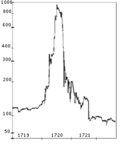
Back بوابة:الاقتصاد Arabic Portal:İqtisadiyyat Azerbaijani প্রবেশদ্বার:অর্থনীতি Bengali/Bangla Portal:Ekonomija BS Portal:Economia Catalan دەروازە:ئابووری CKB Portál:Ekonomie Czech Portal:Wirtschaft German Πύλη:Οικονομία Greek Portal:Economía Spanish
The Business and Economics Portal  Business is the practice of making one's living or making money by producing or buying and selling products (such as goods and services). It is also "any activity or enterprise entered into for profit." A business entity is not necessarily separate from the owner and the creditors can hold the owner liable for debts the business has acquired. The taxation system for businesses is different from that of the corporates. A business structure does not allow for corporate tax rates. The proprietor is personally taxed on all income from the business. A distinction is made in law and public offices between the term business and a company such as a corporation or cooperative. Colloquially, the terms are used interchangeably. (Full article...) Economics (/ˌɛkəˈnɒmɪks, ˌiːkə-/) is a social science that studies the production, distribution, and consumption of goods and services. Economics focuses on the behaviour and interactions of economic agents and how economies work. Microeconomics analyses what is viewed as basic elements within economies, including individual agents and markets, their interactions, and the outcomes of interactions. Individual agents may include, for example, households, firms, buyers, and sellers. Macroeconomics analyses economies as systems where production, distribution, consumption, savings, and investment expenditure interact; and the factors of production affecting them, such as: labour, capital, land, and enterprise, inflation, economic growth, and public policies that impact these elements. It also seeks to analyse and describe the global economy. (Full article...) Selected articleThe Han dynasty (206 BC – 220 AD) of ancient China experienced contrasting periods of economic prosperity and decline. It is normally divided into three periods: Western Han (206 BC – 9 AD), the Xin dynasty (9–23 AD), and Eastern Han (25–220 AD). The Xin regime, established by the former regent Wang Mang, formed a brief interregnum between lengthy periods of Han rule. Following the fall of Wang Mang, the Han capital was moved eastward from Chang'an to Luoyang. In consequence, historians have named the succeeding eras Western Han and Eastern Han respectively. Selected image
Selected economyThe economy of Poland is an emerging and developing, high-income, industrialized mixed economy that serves as the sixth-largest in the European Union by nominal GDP and fifth-largest by GDP (PPP). Poland boasts the extensive public services characteristic of most developed economies and is one of few countries in Europe to provide no tuition fees for undergraduate and postgraduate education and with universal public healthcare that is free at a point of use. Since 1988, Poland has pursued a policy of economic liberalisation but retained an advanced public welfare system. It ranks 19th worldwide in terms of GDP (PPP), 21st in terms of GDP (nominal), and 21st in the 2023 Economic Complexity Index. Among OECD nations, Poland has a highly efficient and strong social security system; social expenditure stood at roughly 22.7% of GDP. The largest component of Poland's economy is the service sector (62.3%), followed by industry (34.2%) and agriculture (3.5%). Following the economic reform of 1989, Poland's external debt has increased from $42.2 billion in 1989 to $365.2 billion in 2014. Poland shipped US$224.6 billion worth of goods around the globe in 2017, while exports increased to US$221.4 billion. The country's top export goods include machinery, electronic equipment, vehicles, furniture, and plastics. Poland was the only economy in the EU to avoid a recession during the 2008 financial crisis. (Full article...) Selected quote"But when the division of labour first began to take place, this power of exchanging must frequently have been very much clogged and embarrassed in its operations. One man, we shall suppose, has more of a certain commodity than he himself has occasion for, while another has less. The former consequently would be glad to dispose of, and the latter to purchase, a part of this superfluity. But if this latter should chance to have nothing that the former stands in need of, no exchange can be made between them. The butcher has more meat in his shop than he himself can consume, and the brewer and the baker would each of them be willing to purchase a part of it. But they have nothing to offer in exchange, except the different productions of their respective trades, and the butcher is already provided with all the bread and beer which he has immediate occasion for. No exchange can, in this case, be made between them. He cannot be their merchant, nor they his customers; and they are all of them thus mutually less serviceable to one another. In order to avoid the inconveniency of such situations, every prudent man in every period of society, after the first establishment of the division of labour, must naturally have endeavoured to manage his affairs in such a manner, as to have at all times by him, besides the peculiar produce of his own industry, a certain quantity of some one commodity or other, such as he imagined few people would be likely to refuse in exchange for the produce of their industry."
TopicsRelated WikiProjectsDid you know (auto-generated) -
On this day in business historyGeneral imagesThe following are images from various business-related articles on Wikipedia.
More did you know
Business news
SubcategoriesRelated portals
Things you can doUrgent and important articles are bold
WikimediaThe following Wikimedia Foundation sister projects provide more on this subject:
SourcesDiscover Wikipedia using portals |
© MMXXIII Rich X Search. We shall prevail. All rights reserved. Rich X Search









































